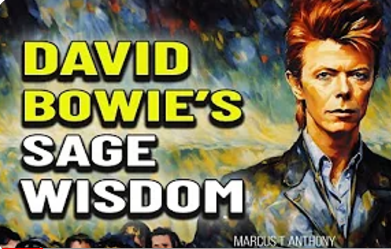There is a price to pay for following your bliss, especially if you choose to deliberately and publicly advocate an alternative philosophy that challenges mainstream opinion and the dominant worldview. In the first of these articles I described my own problems as a futurist with an alternative take on looking at the future, and how difficult it has been to gain a voice in the academic world despite having a PhD. In the second article I outlined some distinctions I have come to learn from my travails; perhaps the most notable being the error in thinking that success would follow automatically just because I followed my heart and publicly shared what I believe to be deeper truths about life and cosmos.
In this article I will offer some practical advice about setting yourself up while living your bliss. My suggestions follow on from my previous insights. After all, these three articles are aimed at helping people who want to develop their own career, business or professional interests while sharing an alternative or spiritual worldview.
I’m not going to go into details about how to set up a business or sell an idea. There are already many teachers and books who have put great materials out there. Instead I am going to focus on a few common issues typically faced by spiritually and mystically-inclined entrepreneurs and creatives.
Take action
If you want to develop an idea it takes time, energy and commitment. Yes, that means you have to work!
Here’s an interesting question for all those of you who have at least some idea of your own calling in this world – doing what you love for a living.
How much action have you taken towards actualising that calling?
In many cases people have a fair idea of what they want to do. They just never bother to do it!
One simple way to begin to eliminate procrastination is to write down three things per day that you can do towards making your dream real. Then do it!
No action = no dream.
Simple.
As I outlined in Discover Your Soul Template, I am a great advocate of introspection as a means to bring a deeper level of consciousness to life. But don’t become such a navel-gazer that you forget to do stuff in the world. Don’t let the conspiracy theorists fool you. You live in a time where the individual is empowered as never before, and where the knowledge and understanding available to you is simply incredible. Don’t waste it!
Deliberate Practice
If you take a look at the most successful people they tend to be very highly skilled at something. And in most cases they had to work really hard to practice and develop those skills. Most had to engage in what some people call “deliberate practice”.
Deliberate practice is the intelligent application of repetition in order to improve performance. New age “go with the flow” philosophies may delude some people into thinking that hard work and good old-fashioned practice are not required to achieve success and excellence in a particular field of endeavor.
Let me assure you that intelligence, sustained commitment, and hard work will almost certainly be required if you are to turn your “calling” into a profession. The truth is that this is a very competitive world, and that standards of performance and excellence have increased dramatically in many fields in recent years. Certainly, if your goal is to reach world-class status, then deliberate practice cannot be avoided.
I highly recommend Geoff Colvin’s Talent Is Overrated as a good introduction to this topic. It shows that deliberate practice is what often separates genius from very good. Colvin outlines the following features of deliberate practice.
- Deliberate practice is hard work. It is not what we normally think of as practice, such as when you strum a guitar for a bit of fun. You have to move out of your comfort zone to perform deliberate practice.
- Deliberate practice is designed specifically to improve performance. This means intelligent thought is put into the practice session, so that deliberate and conscious goals for improving performance are met. This in turn requires you to carefully define the elements of your skill that require enhancement, and then go about working at those. Benjamin Franklin, for example, wanted to be a great writer, but realized that his vocabulary was lacking, so systematically set about improving it.
- Practicing something systematically and intelligently is highly demanding. It requires a great deal of focus and concentration. Studies have shown that excellent violinists practice a lot more than those of lesser skill. Keep in mind that research indicates that practice sessions of more than ninety minutes at a time are counter-productive.
Still, it is entirely possible to do such “hard” work in alignment with Spirit, keeping your mind present and mindful when deliberate practice is required. When I was studying for my PhD I was also working full-time. I used to get up at 5.00 a.m. and write 500 words on my thesis every day. Although commitment and hard work were required, I enjoyed the whole process because more often than not I was fully present and in a state of flow. I completed my doctorate in less than four years (including publishing a dozen journal articles and a book) The whole process went so well that I developed the idea of Integrated Inquiry, an intuitive and creative approach to research.
Develop people skills
I know this will not go down well with many mystically-inclined folks, but you are just going to have to suck it up I’m afraid.
The necessity to take action means you are going to have to get out into the world. You are going to have to work with other people. You are going to have to develop people skills. Yes, that means you! If you have been meditating on a cushion in the garage for the last twenty years you are just going to get off your bum and learn some new skills.
Communication skills can be developed. You do not have to be a natural extrovert or carry on like Anthony Robbins. It is not difficult to learn how to give a public talk, develop your elevator pitch or talk up your idea to a level of competence. Remember what I said about deliberate practice?
Think of social intelligence as being like any other ability, not merely an innate, immovable trait.
The requirement to develop people skills might mean that you have to get rather uncomfortable. But if you don’t like discomfort, I suggest you go back to that cushion in the garage for another twenty years. Because without crossing beyond that comfort threshold regularly, you ain’t going nowhere.
Yes, living your bliss requires discomfort. It’s not a contradiction. It’s just life.
Think about this related point. In his book The Luck Factor, Richard Wiseman indicates that one of the four traits of “lucky” people is that they typically have a wider circle of friends and acquaintances. In other words, they are not lucky in the classical sense. They just rub shoulders with more people, so serendipity is mathematically more likely to flourish.
Be intelligible
You have to take the time to study your market and to deliver products and services that are either needed or attractive to people. As futurist John Naisbitt says, if you move too far ahead of the parade, then nobody is going to be able to see where you are. When you are dealing with other people you need to work in a space, and with ideas and tools that allow those people to understand who you are and what you are doing.
Futurist Sohail Inayatullah once gave me some great advice on how to introduce spiritual concepts to public talks. He said he always begins with the mundane, and with ideas and concepts that the audience is familiar with. Unless it is a central focus of his subject matter, he waits til near the end of his presentation to introduce spiritual concepts. Inayatullah says this works very well. I have followed his advice, and found it to be true. People can become suspicious if you appear to be too other-worldly right from the start.
I know this runs counter to what you read in many new age philosophies, but let me be blunt. When you embark upon a spiritual journey the world will not change to accommodate your readjusted spiritual worldview. You have to make your ideas fit the system.
If your ideas cannot be understood, then nobody will listen to you. It doesn’t matter how grand or brilliant they are; it remains a universal truth. I learned this the hard way. Much of my academic writing is just too far beyond the system to be attractive to universities. When I was applying for jobs in Education faculties my CV featured scores of papers about mind and cosmos. Other candidates had one or two papers about things like classroom management or educational leadership. Who do you think got the job(s)?
Sure, you might change the world by dramatically shifting perceptions, paradigms and markets. Steve Jobs did just that, to a certain degree (as I shall mention below). He helped revolutionise the computer industries, mobile devices, animation and music.
But you still have to sell your stuff. You still have to speak a language that other people can understand and relate to. And if your idea is unintelligible or poorly designed or presented, nobody is going to buy it.
Feedback
It is vitally important to listen to the feedback you get from the client, the marketplace, and the cosmos. If nobody is buying your stuff or employing your services then there is no use complaining and calling them stupid. You have to find a niche, a way to get a foothold in the market. To do this you will have to frame or market your product in a way that is attractive to people, and that they can understand.
I highly recommend Walter Isaacson’s biography of Steve Jobs. As you may know, Jobs was quite alternative in his thinking. He dropped LSD as a youth, then went to India in search of spiritual enlightenment. He had a liking for Buddhism and often used terms like “karma”, “a calling” and “following your intuition”.
Now, if we are to believe the naive law of attraction advocates, then Jobs – a multi-billionaire and one of the most successful men ever to step on the planet – should have been a laid back character who spent most of his time blissing out while visualising manifesting his destiny as Apple CEO; then calmly waiting for the cosmos to drop everything in his lap.
In fact Steve Jobs was almost the precise opposite. By all accounts he was a temperamental control freak with an obsession for having his way with almost every detail. He was obsessed with quality, and often flew into a rage when he saw work being done that he considered “shit”. He railed and verbally abused co-workers in a ways that would be considered inhumane by many.
And as Isaacson’s book indicates, Jobs was scared. He was full of doubt and fear. He was terrified of failure and not being good enough. Orphaned at birth, this instilled in him a great fear of rejection.
According to the naive law of attraction, the universe should have spat Jobs out and left him impoverished and abandoned on the street.
Instead it made him unimaginably wealthy.
What does this tell us? It tells us that stuff doesn’t happen by magic. Detail, precision, and understanding of the market place are vital to success. Nor does having doubt and fear prevent you from living your bliss. If you go out into the world thinking that the cosmos owes you a living just because you are following your dream or you have cleared out all your “blocks”, the world is likely to spit you out.
Don’t be an angry mystic
I have heard numerous mystically-inclined people say something like “Capitalism sucks! I’m not doing this for money! I’m spiritual!”
They have an attitude problem.
There is nothing intrinsically wrong about money and markets. Money can do just as much good as evil. Exchanging cash is just the way the system works.
What would you rather do? Would you rather be sitting at home on social security (hmm, that’s money, no?) and ranting against a world that is evil and materialistic, even as all your talent and soul aptitudes remain untapped? Or would you rather be joyfully sharing your gifts with the world, while accepting a little of that filthy lucre at the same time?
I believe that it is important to work with the system. It is not necessary to blindly accept it and to sell your soul. You can work within it without being a part of it. Play in the system, keep your values, listen to your heart and do no harm. That can’t be so hard, can it?
Many new agers and spiritual folk talk about love and peace. But if you actually listen to them you soon discover that they hate the world and they hate people. There is an anger, blame and judgment burning within them – often rage. “I am not one of the mindless sheeple! I am spiritual!” They reject the world.
It is not necessary to reject the world. Part of your journey is to forgive this place. All judgment is a mental act of annihilation. Judging the world is no different. How can you shine your light in the world if what you really want to do is annihilate it? What kind of message is that sending out to the universe?
I say get off your high horse and forgive the world! Acknowledge your own anger and pain, because that is your responsibility. Learn to shine your light from within, and then move out into the world. What greater gift could you possibly give?
Back to that price
There is no guarantee of professional success if you follow your calling. But if you shine your heart light, you will at least offer something to the world that you cannot by sitting at home and meditating and grumbling about how shitty the world is.
All this is not easy. This world is not for sissies. Acknowledge your weaknesses and delusions. Stand up for yourself and for what you believe. Take action, work hard and work smart. Be prepared for failure, and don’t take it personally. Step out into the world lightly, joyfully and with courage. Be strong, be noble and be as loving as you can.
Forgive others when they don’t understand what you are doing. Most of all, take note of their feedback. It just might be useful.
Living your bliss is sometimes not as blissful as you think! Your great idea will not manifest itself without you applying your God-given intelligence and work ethic in the real world.
Sorry to burst the new age bubble. But somebody had to do it.






